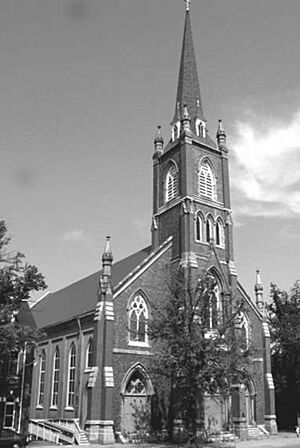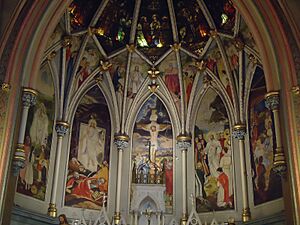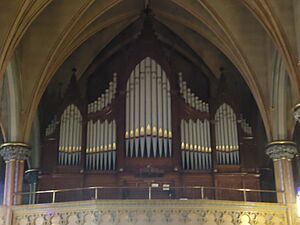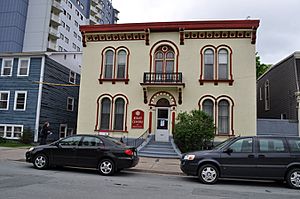St. Patrick's Church (Halifax, Nova Scotia) facts for kids
Quick facts for kids St. Patrick's Church |
|
|---|---|

Historic St. Patrick's Church
|
|
| 44°39′15″N 63°34′59″W / 44.654085°N 63.583119°W | |
| Location | 2263 Brunswick Street Halifax, Nova Scotia B3K 2Y9 |
| Country | Canada |
| Denomination | Roman Catholic |
| Website | [1] |
| History | |
| Status | Active |
| Founded | 1843 |
| Dedication | Saint Patrick |
| Architecture | |
| Functional status | Parish church |
| Architect(s) | Henry Peters |
| Style | Gothic Revival |
| Groundbreaking | August 8, 1883 |
| Completed | December 27, 1885 |
| Administration | |
| Deanery | Halifax Central |
| Archdiocese | Archdiocese of Halifax-Yarmouth |
St. Patrick's Church is a very old and important Roman Catholic church in Halifax, Nova Scotia. It's located on Brunswick Street. The church community started in 1843. The beautiful building, made of brick and granite in the Gothic Revival style, opened in 1885.
This church is recognized as a special place. It became a Provincial Heritage Building in 2010. It has also been listed by Canada's Historic Places since 2008. The National Trust for Canada even put it on their "Top 10 Endangered Places List" in 2008. Today, the church is looked after by the Society of Jesus.
Contents
The Church's Story
Irish Settlers Arrive
The first Irish settlers came to Nova Scotia in 1749. Most of them came from southeastern Ireland. They chose to settle in Halifax. Even though they didn't have much money, they often helped pay for important churches. They supported the building of St. Mary's Basilica and St. Patrick's Church.
Early Days of the Parish
The St. Patrick's church community began in 1843. It was named after Saint Patrick because many Irish people were part of the group. At first, they met for services in a stable. This stable was located at the corner of Gerrish and Gottingen Streets.
Two years later, in 1845, the community moved. They started using a chapel that used to be an Anglican Garrison Chapel. In 1851, this chapel was made bigger. A tower and a tall spire were added, and a bell was put in the tower.
Building the New Church
More and more people joined the church community. Because of this, plans were made to build a much larger church. This new church would be able to hold many more people.
A local architect named Henry Peters was chosen to design the new building. He had also designed St. Matthew's Church in Halifax. Peters was a well-known builder in the area. He is buried in Holy Cross Cemetery.
The last church service in the old building was on April 2, 1883. On August 8, 1883, the Archbishop of Halifax, Cornelius O'Brien, laid the first stone for the new church. The very first service in the new church's basement was on December 22, 1883. The whole church was finished and opened on December 27, 1885. People attended a service at the old altar in the upper part of the church.
Church Improvements and Art
Between 1898 and 1903, beautiful stained glass windows were put into the church. Sadly, almost all of these original windows were broken. This happened during the Halifax explosion on December 6, 1917. In 1922, a company from Germany and New York replaced all the windows. They also did other repairs to the church.
By 1944, about 5,600 people were part of the church community. In 1946, the church was repainted and maintained. In 1953, a famous artist named Joseph Purcell was hired. He painted the large pictures (murals) above and behind the altar. Joseph Purcell himself was married in this church.
The Historic Organ
The organ at St. Patrick's Church is very special. It was built in 1898 by Casavant Frères in Québec. This organ is still exactly as it was built. It is the oldest Casavant organ still being used in Canada. It is also the only one of its kind that is still in its original condition. The organ has 35 "speaking stops" and 2,212 pipes! Because of how unique it is, the Royal Canadian College of Organists named it a National Historic Organ in 2006.
Recent Events
In the 1960s and 1970s, some changes were made to the church. These changes followed new rules from the Second Vatican Council. Parts of the altar rail were removed, some statues were taken away, and a smaller altar table was placed in front of the main altar.
On September 14, 1984, Pope John Paul II held a special Mass. This Mass took place on the Halifax Common, which is very close to St. Patrick's Church. In many photos from that day, St. Patrick's Church can be seen in the background.
In 2007, the church members learned that St. Patrick's might close. However, the closing date was moved to June 2008. This gave the community a chance to raise money. They wanted to fix up and keep the church open. The Saint Patrick's Church Restoration Society was formed. In September, they officially started their fundraising campaign. On December 16, George Frideric Handel's Oratorio, the Messiah, was performed. This was the first of eight concerts to raise money for the church.
In 2008, the Restoration Society held the first Saint Patrick's Church New Year's levee. In May, the Heritage Canada Foundation added St. Patrick's Church to its "Top Ten Endangered Places List." This list highlights important buildings that are at risk. By June, the Society announced they had raised enough money to save the church! The Society and the Archdiocese signed an agreement. This agreement means the Society is now in charge of restoring and taking care of the church.
St. Patrick's Schools
In 1857, a school was opened in the church's basement. This school moved to its own building in 1867. Later, in 1921, St. Patrick's Boys' School opened across from the church. St. Patrick's Girls' School had opened earlier, in 1888, on the same street. In 1954, these schools joined together. A new school, St. Patrick's High School, was built on Quinpool Road.
Saint Patrick's Band
The Saint Patrick's Band started in 1873. It was a very popular local band in Halifax during the Victorian era. They played many different kinds of music and were often asked to perform.
Jesuit Centre of Spirituality
The Jesuits first came to Halifax in 1940. They took over running St. Mary's College, which later became Saint Mary's University. The high school part closed in 1963. In 1974, the university was given back to the Archdiocese of Halifax.
In 1952, the Jesuits started the Canadian Martyrs' church community. In 2005, this community was also transferred to the archdiocese. The Jesuits moved into the area and began serving as priests later that decade. The Jesuits stayed in the city. The next year, they started the Jesuit Centre of Spirituality next to St. Patrick's church.
This center is a place for Ignatian spirituality. It helps people in Atlantic Canada with spiritual direction. It also offers daily prayer with scripture and the Spiritual Exercises of Ignatius of Loyola.
Inside the Church
See also
- List of Jesuit sites










